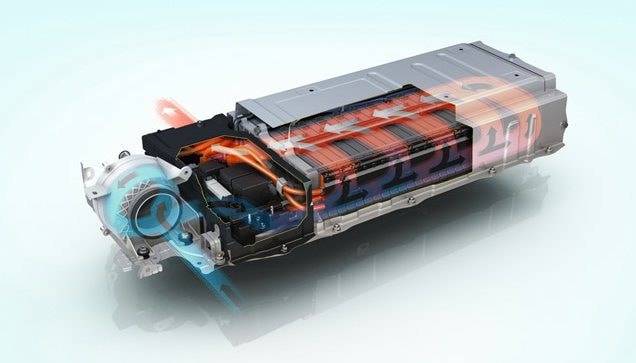Toyota to launch solid-state battery cars in 2027–2028
Toyota forms a joint venture with Sumitomo Metal Mining to produce cathode materials for solid-state batteries, aiming for commercial vehicles in 2027–2028. The technology promises fast charging and longer driving range.
Toyota announced plans to commercialize solid-state batteries for electric vehicles in 2027–2028, after joining hands with Sumitomo Metal Mining in a joint venture to mass-produce cathode materials. The news, announced on October 8, marks a new step for the Japanese automaker in the race to improve the electric vehicle experience with faster charging times and longer driving ranges than current technology.

Strategic move with Sumitomo Metal Mining
According to a joint statement, Toyota and Sumitomo Metal Mining will mass-produce cathode materials for solid-state batteries, which will directly serve Toyota's battery-powered electric vehicles. The two sides have been working together since 2021 and now claim to have developed a "high-durability cathode material" for practical applications. Technical details of the new material have not been released.
Proactive cathode material sourcing is the key to bringing solid-state batteries to large-scale production. This is one of the components that determines the battery's energy storage capacity and charge-discharge cycle durability.
Solid-state batteries: safer, high energy density potential
Unlike conventional lithium-ion batteries, which use a liquid electrolyte, solid-state batteries use a solid electrolyte instead. Since liquid electrolytes are flammable, switching to a solid electrolyte reduces the risk of fire or explosion. At the same time, solid-state batteries have the potential to achieve higher energy densities, meaning they can provide longer range with the same battery capacity.
If put into practice as intended, the dual benefits of safety and energy storage would make a significant difference for electric vehicles: charging times could be shortened and operating ranges could be significantly increased compared to current technology levels.
Industry dynamics and commercialization roadmap
Toyota plans to launch a new line of solid-state battery-powered vehicles in 2027 or 2028, a timeline that would see the development move past the foundational research stage and into production preparation.
In addition to Toyota, many other automakers such as Honda, Nissan, BMW and Volkswagen are also developing solid-state batteries themselves or collaborating on them. According to Inside EVs, many companies aim to introduce electric vehicles using solid-state batteries in the next few years.
Reference points from other manufacturers
- Honda has said it will begin producing solid-state batteries for electric vehicles that can travel 620 miles (1,000 km) per charge by 2030; that figure is said to be double the range of today's best electric cars.
- ProLogium, a maker of ceramic batteries, last year announced a solid-state battery concept that can charge from 5% to 60% capacity in 5 minutes.
"High-strength" cathode materials: the key to going further
The highlight of the collaboration between Toyota and Sumitomo Metal Mining is a new cathode material described as “highly durable.” In solid-state batteries, material durability at the electrode–electrolyte interface is crucial to limiting capacity loss and ensuring service life. However, neither company has disclosed details of the structure or composition, so the specific extent of the improvement cannot be determined.
Despite the lack of details, the focus on mass production suggests the goal is not just in the lab, but if successful, it could pave the way for larger capacity battery packs that can power long-range electric vehicles with faster charging capabilities.
What is clear, and what remains to be revealed
- Clear: Toyota and Sumitomo Metal Mining form joint venture and aim to mass produce cathode materials for solid-state batteries; plan to launch solid-state battery vehicles in 2027–2028.
- It's clear: Solid-state batteries replace liquid electrolytes with solid electrolytes, thereby reducing the risk of fire and explosion and potentially achieving higher energy densities.
- Pending: The structure and parameters of the new cathode material; the specific production capacity, battery capacity, charging speed and operating range of vehicles that will use the technology.
Milestones and key information
| Mold | Content |
|---|---|
| October 8 | Toyota and Sumitomo Metal Mining announce joint venture to produce cathode materials for solid-state batteries |
| 2021 | The two sides began researching materials for solid-state batteries. |
| 2027–2028 | Toyota plans to launch a car using solid-state batteries |
| 2030 | Honda targets solid-state battery range of 620 miles (1,000 km) per charge |
| Last year | ProLogium announces concept of charging 5% to 60% in 5 minutes |
Conclusion: The solid-state race enters a phase of acceleration
The announcement of a partnership with Sumitomo Metal Mining takes Toyota one step further in its solid-state battery roadmap, with a target commercialization date of 2027–2028. While technical details remain under wraps, the focus on mass-producing “high-durability” cathode materials and potential safety and energy density advantages suggest the technology is moving closer to commercial vehicles. The industry as a whole is picking up steam, with milestones from Honda, along with ProLogium’s fast-charging concepts, signaling a period of intense technological competition in the coming years.
